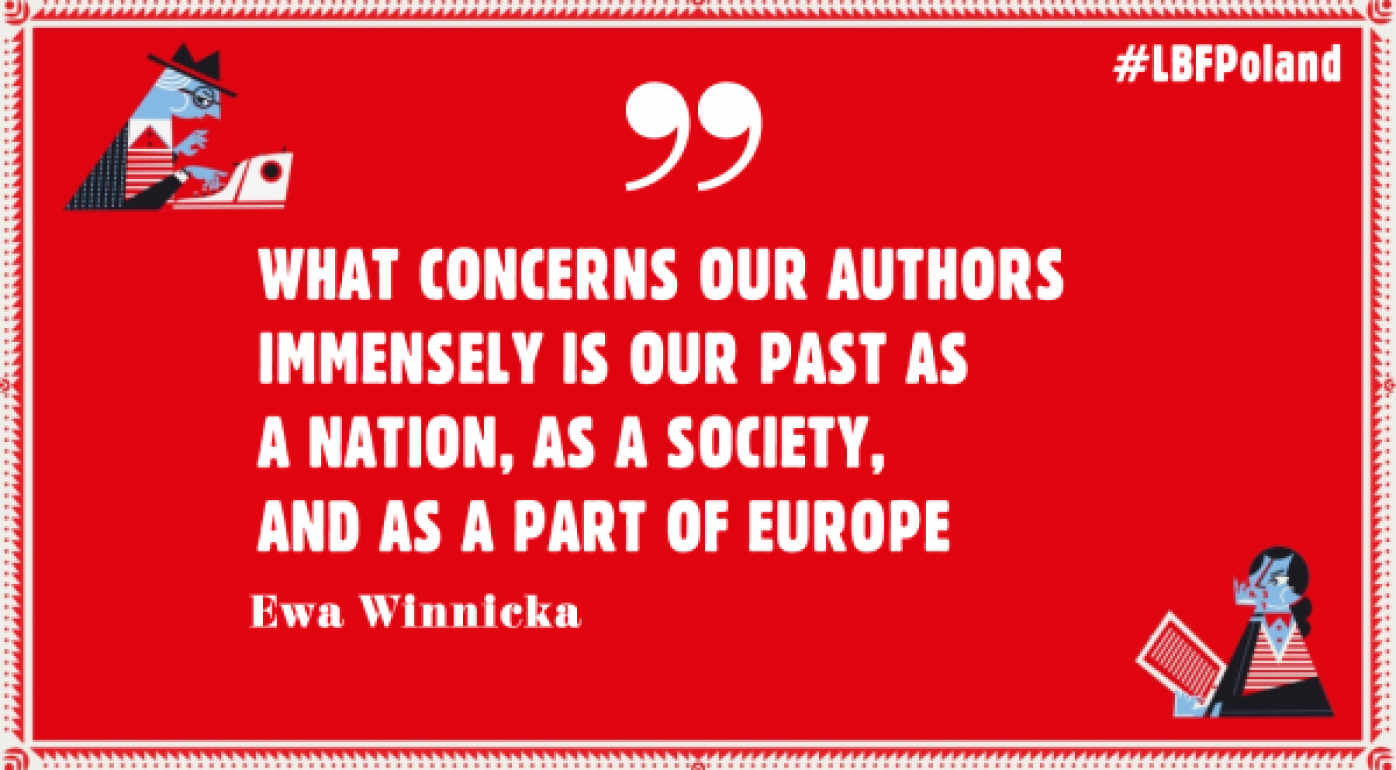In 2014 Polish writer Ewa Winnicka's book of reportage Angole (in English The Brits) was published in Poland. It documented the stories of Polish people living in the UK. Winnicka spent 3 years travelling the length and breadth of the country, following leads to find interesting stories and gathering them like an anthropologist. By the end of the project she had interviewed over 400 people. Winnicka wanted to present the Polish community in the UK in all its diversity and to include the many problems faced by immigrants coming to the UK, as well as the things that are gained. Below is a series of fragments from the book, which is as yet unpublished in the UK.
Ladies and Gentlemen. Throughout its history, this land has seen only one invasion like it. In the eleventh century, William the Conqueror arrived and, following the fateful Battle of Hastings in 1066, Britain was flooded with Normans.
After that, we had relative peace; the fifty thousand Huguenots that arrived from 1670 onwards, or the hundred thousand or so Russian Jews that settled here between 1881 and 1914, are hardly worth mentioning. The twentieth century was a challenge for us, though. The Scots and the Irish began to arrive, but since they had been part of Britain for so many years already, they mostly knew how to behave; they were just colourful strangers from the far corners of the empire. Our fondness for civil liberties was world-famous and could be enjoyed by all.
But all this was nothing compared to the alleged two million Poles —and the handful of Lithuanians, Russians and Ukrainians thrown in for good measure — who have been floating around here, there and everywhere since 2004. We’re told they’ve contributed two billion pounds to our economy and that they’ve filled the holes in our jobs market. Nonetheless, on the streets of traditionally respectable towns in Lancashire or Lincolnshire, it’s getting harder to hear a word of English spoken. You could fall into the river and scream for help, and you can’t be sure anyone will understand you. There’s absolutely no doubt whatsoever that this torrent, guided as it is by EU directives, is changing the face of Britain. What will our country look like following this invasion? What will be left of it? [1]
The invaders speak out
1. Marcin, Dartford

I’m new in the job and my colleagues don’t speak to me much. I’m not to be trusted, since I don’t live with any of them and I haven’t been out drinking with them. I don’t tell them that I used to be a manager in one of the best advertising agencies in Poland, only that I gave my bosses a smack in the chops and that I felt like getting away. I have a wife and kids and I want to go back to them.
They start chatting to one another: “Hey, dickhead. You fuck anyone last night?”
“Fuck off, you dick”
“For fuck’s sake — you on plastic or aluminium?”
“Go fuck yourself”
“Get picking, dickhead, get picking”.
Great, they’ve chatted, now everything’s fine.
Janek, on the right, is forty years old but looks about fifty. He’s been working on plastic wrap for ten years; by working here, he’s just asking for a premature death, even though he doesn’t know it. Either that or he doesn’t give a shit. I also don’t know how he’s supposed to fuck, given that there are very few women working on the sorting line. The young ones are all taken by Cossacks from Albania. The older ones look like their grandmas. The boys don’t have much to look for in town either. The unattractiveness of Polish men is as world famous as bigos and kiełbasa. It’s even known in Dartford, which is inhabited by poor white trash, sixteen-year-old girls in their third pregnancy who are third-generation benefits claimants.
Janek has been working here for ten years and makes six hundred and fifty pounds a month. That covers his fags, vodka, and a room which he and other pickers from the plant rent in one of Dartford’s rundown backstreets. He doesn’t make enough to return to Poland, though. I don’t know if he thinks about it, because he got out of prison ten years ago and there’s really nothing for him there. He’ll stay at the sorting plant until the day he dies.
Translated by Garry Malloy
2. Jacek, London

The excessive thrift of families can prove to be a technical problem. I recently had a guy who had hanged himself, whose family decided it would get an estate car and fetch a cheaper coffin from Poland. They hired me to take care of the formalities and to receive the corpse. I dressed the deceased in national costume and placed him in the coffin, but the coffin was too small and his legs were sticking out. I took out the pillow, to no avail. I tried turning the head to the left — no good, then to the right — no good. It was like a scene from a horror film; the cremation was due to take place in two hours. The family stood their and watched. In the end, I bent his legs at the knees. Not only had the bloke topped himself, leaving behind a wife, sister, son and daughter, but then they sent him on his final journey in a coffin that was too small for him.
Translated by Garry Malloy.
3. Ola, Belfast

We’re like a bull in a china shop here. We think that we’re in Ireland, and that it’s only by some fluke that we get paid in pounds, rather than euros, but if you call a Loyalist ‘Irish’, it’s as if you’ve spat in his face. There’s no greater insult you can give him.
One Polish woman here took out a mortgage on a flat because she saw some ridiculously cheap properties for sale in an estate agent’s. She has a ground-floor flat with a garden. She didn’t suspect a thing, not till she actually moved in, when she immediately got pelted with eggs by the locals. Straight after that, someone else threw stones at her. A while later, a woman from the neighbourhood called round to ask her whether she was happy with the opening and closing times of the gate to the street. What gate? She rang us, so we told her that her flat was on the border of the Catholic and Protestant areas, which, for reasons of security, are separated by a so-called ‘Peace Wall’. Isn’t that ironic? The peace gate gets opened twice a day at mutually-agreed times. When the gate’s open, the youths from rival neighbourhoods pass through and fights break out. We had to do battle with Belfast City Council to get them to put bars on all her windows. They put up a fence and poured concrete on top. Then they stuck pieces of broken glass into the concrete. This woman lives in a fortress. But it’s cheaper.
Translated by Halina Boniszewska
4. Romek, London

The third mystery of the code is the language. They have an obsession with their language. They feel as if they’ve lost control of it. We have Australian and American English in circulation, and also the worst kind of ‘Euro English’, the kind we see in documents from the European Commission in Brussels – technical language, stripped of all nuance. That’s why I’ve made the effort to learn English idioms – the kind of language that only the English use. I know, for instance, the difference between a sofa, a settee and a couch. I differentiate between ‘toilet’ and ‘loo’. I might say: ‘We managed to do it in the nick of time;’ or maybe: ‘It’s a real dog’s breakfast;’ or ‘It’s a hospital pass,’ and I can see from the person’s reaction that he thinks I’ve cracked the code. It means I’m from nearly the same social class as he is – no longer quite as foreign.
Translated by Halina Boniszewska
5. Jurek, London

In Poland it’s still regarded as perfectly acceptable to slap your child on the bottom, or even give him them the strap, but it’s not like that here. We had one six-year-old who had signs that he’d been beaten on his bottom and back. I can’t tell you what we did because of court proceedings. What I can say is that in this country it would have been against the law to not have done anything. We spoke to the six-year-old because we’d noticed that he’d been very violent towards his teddy. We said: ‘We mustn’t beat up anyone.’ He replied: ‘Yes, you can! You just can’t hit them in the back; you can hit them on the bottom, and you can smack them in the head as well, but not with anything too hard.’
With my experience here over the last ten years, I can say that the Poles learn very quickly what’s within the law here. I bet that when they hit their children, it’s no longer on the back and the legs, where the signs of abuse would be visible.
Translated by Halina Boniszewska
6. Dorota, London

Anyway, I got the job. At the very end of his interview, the English candidate asked whether additional payments would definitely be made for all the post mortem examinations, and he also admitted that he was hoping to move to Italy. He gave the impression that he didn’t really want to work at the hospital. The Brits have a complex about America, and they use Nobel prize-winners as a gauge. We have a Cambridge graduate friend who went on to Harvard ‘so I can learn something’. The UK doctors are so reluctant to do paid weekend work here that we now have a situation whereby this work is carried out by five thousand German doctors. It pays them to fly over from Hamburg to Bristol. There was a scandal not so long ago when a German plastic surgeon messed up an operation. He’d been over-tired. He’d spent the whole week working in Germany, and then he worked the weekend in the UK. His scalpel slipped.
When the English candidate was out of the running, I was ecstatic.
Translated by Halina Boniszewska
7. Bożena, Scunthorpe

I started off on the bacon conveyor belt – in other words, a production line that ran the full length of the building. You had to place a perforated tray on the conveyor belt and fill it with bacon rashers. The difficulty lay in placing it properly because if you didn’t, there was the risk that the foil would perforate during a later part of the production process.
What was even trickier was trying to catch hold of the bacon rashers with the conveyor belt moving at high speed. If the bacon landed on the floor, you had to pick it up and chase after the tray, then race back to pack the other trays. My eyes used to get really sore from having to watch the bacon constantly; in fact, my eyes hurt even more than my hands. We swapped round after three hours. I had to stop packing and start weighing – again at high speed! Our manager explained that our factory regulations stipulated that we had to change tasks, as this was considered good for our personal development. When I first started working at the factory, we had fifteen people at the conveyor belt – mainly Poles, of course. After only a few months, this number went down to five. You want to know why?
It was because of a certain Pole who worked on the production line. He used to arrive in the morning and set the tempo. We had a Portuguese man and a Pole on the production line. I found it just about bearable with the Portuguese man, but the Pole wanted to show off at someone else’s expense. I found out he was gay. I think he took it out on the women on the production line who had to catch the bacon. If he was in a foul mood, he’d speed it up even more.
At first we had people training us to catch the meat. Later on, the factory had so many willing workers that it wasn’t worth paying people to train us: if you couldn’t learn on the job, you lost your job.
Translated by Halina Boniszewska
8. Miki, London

After four years of talking about the weather, a work colleague asked me if I fancied going to watch a concert. It was a garage band. Sure, I’d come. In my old place, a group of us used to go out for lunch together, and for drinks on Thursdays or Fridays. (...)
It got to nine o’clock and everyone would start heading home. In four years no one had ever invited me back to theirs. As soon as work was finished — cheerio. I’d make my way back to my hotel. It had taken my workmate two years to pluck up the courage. That was my first experience of meeting English people outside work. People like Nick’s white, educated pals from his time at Oxford. All lawyers and historians. They were all doing well in life, some of them even had their own flats. They tried to hide the fact they were posh, but their accents gave them away. All of them attended public schools, some of them went to boarding school. The conversations with Nick’s friends were wonderful; we spoke about politics, about the state of the world. They are well-read and see things from a subconsciously imperial perspective. They see the world in a non-fragmented way. Discussions with them is like a breath of fresh air; important matters don’t end at the Odra and the Nysa, not even at Berlin or Moscow. They are very socially aware, socially sensitive — they are active in pro-social organisations, they run marathons and raise money for charity. One of these cultural polymaths had been picked up recently for peeing in a doorway. The police took him into custody. We almost died laughing. Since then, I’ve been protesting against the stereotype that only Poles piss where they shouldn’t. Conversations about feelings are akin to being put to the rack. Nick’s friends don’t gossip and they don’t confide in others. There’s no “let’s sit down and talk it out”.
Translated by Garry Malloy
9. Wojtek, London

We got down to work. First of all, we checked to see what the local population needed most. To do this, we wrote a flyer that said: “If you need anything done — call”. We had tens of thousands of these flyers printed, all A6-sized, black-and-white and single-sided. We delivered them to the same houses we had once delivered pizza to.
And then — bingo. People began calling us, telling us they required a handyman, or a cleaner. At that point we froze. What do we do now? I called a student who knew English and asked her what we should do. She said: “Charge the client six pounds an hour, pay me four to do the cleaning and you’ll make a profit”. She was our only cleaner in that first month; after two months we had five cleaners on our books, after six months we had thirty and two years down the line we were employing one hundred and fifty. They multiplied like rabbits and worked all over the city.
At the beginning, the Brits would ask if our cleaner spoke English. They had noticed that a particular cleaner would fail to respond to them, whereas I scarcely faltered. I explained that conversation wasn’t necessary for cleaning. It’s enough that the girl is trained in cleaning, since most of us don’t know how to clean, how to spend three hours cleaning everything.
If you want to clean everything, you need to have a system. I worked out a system by myself and became a specialist. The system consists of not cleaning anything above eye level and tricking the client. For example, take cleaning the front of the door and wiping the door handle: the first thing client will do is put a key in the door and grab the door handle. The client can’t then say: “Gosh, that’s dirty”. Next, when he opens the door, he should find the hallway spotlessly clean, and the same goes for kitchen worktops and bathroom surfaces. If those areas get cleaned, the customer will be yours for life and you can be forgiven for any fuck-ups elsewhere.
We can, of course, move sofas and tables to clean underneath, but it’s worth clearly stating that there won’t be enough time to get everything done if we do. Therefore, we do a so-called surface clean, in other words: anything that can be seen. The greatest feat in the business is not the cleaning, but the logistics of transporting cleaners around such a large city. The journey from one house to another should be as short as possible and be done in as little time as possible, preferably within fifteen minutes. This is so that each girl is able to work most efficiently during an eight- or nine-hour shift, and not waste time travelling. Of course, the girls can break up those hours, but they clearly get the job done.
Translated by Garry Malloy
10. Rafał, Edinburgh

At seven o’clock every evening, the teachers would summon all the pupils in the school, from the youngest mites to the oldest coots (who were nearly eighteen). During these assemblies, the eldest pupils would take it in turns to check attendance. It was a different boy each day. Finally, the day came when it was my turn. I read the list, and after each name I could hear peals of laughter. A hundred peals of laughter. But I couldn’t stop reading. They were laughing at my accent. It didn’t matter; nobody spoke to me, anyway.
I have a Polish friend who was well liked at another boarding school. Admittedly, his was perhaps less snobbish than mine. His English classmate’s parents took him on holiday with them to their house in Jamaica. They treated him like a charity case, so they’d have something to brag about in company.
“Oh, by the way, Barbara dear, we had a Pole to stay in July.”
“Ooh, really? He didn’t bite, did he?”
Translated by Garry Malloy
[1] See: How the invasion of immigrants into every corner of England has made a mockery of PM’s promise to close the door, “DailyMail”, 31 March 2013; The Polish paradox, “The Economist”, 14 December 2013; Mass immigration has left Britain “unrecognisable”, says Nigel Farage, “The Telegraph”, 28 February 2014.



